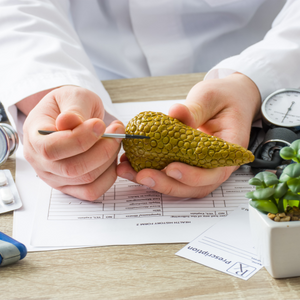Serous Cystadenoma

Pancreas cysts are fluid filled sacs arising within or from the pancreas, a large gland that sits behind the stomach. Serous cystadenomas are benign cysts lined by special types of cells which secrete thin fluid into the cyst. Serous cystadenomas occur most frequently in middle-aged women but can occur in men as well. Some of these cysts have special features such as a honeycomb-like appearance seen on MRI or ultrasound exams done from within the stomach and small intestine (endoscopic ultrasound).
Serous cystadenomas very rarely become cancerous. When a cyst is definitively diagnosed as a serous cystadenoma, the cyst is left alone unless it is large enough to displace the nearby organs and cause symptoms.
FAQs
Many people with serous cystadenomas do not have any symptoms. However, if the tumor is large or causes pressure on nearby organs, it may cause symptoms such as abdominal pain, jaundice (yellowing of the skin and whites of the eyes), and weight loss.
Serous cystadenomas are usually diagnosed with imaging tests, such as CT scan or MRI, and a procedure called endoscopic ultrasound (EUS). EUS involves inserting a thin tube with an ultrasound probe into the digestive tract to get a close-up view of the pancreas. A biopsy, which involves removing a small sample of tissue for laboratory testing, may also be performed to confirm the diagnosis.
Treatment for serous cystadenomas is usually not necessary but in rare cases in which it causes symptoms, surgical resection may be necessary. If the tumor is small and not causing any symptoms, no treatment is needed. Further, surveillance is not usually recommended in this scenario.
There is no known way to prevent the development of serous cystadenomas. However, maintaining a healthy lifestyle, including not smoking and getting regular exercise, is generally recommended.
The long-term outlook and prognosis for people with serous cystadenomas is generally good, as these tumors are benign (non-cancerous). However, if the tumor is large or causing symptoms, it may need to be surgically removed.
Serous cystadenomas are typically treated with surgery to remove the tumor. Medications do not have a role in the management of pancreatic cysts overall.
It is generally recommended that people with serous cystadenomas maintain a healthy diet and exercise regularly to help manage the condition. However, specific lifestyle changes will depend on the individual’s specific situation and should be discussed with a healthcare provider.
It is possible for serous cystadenomas to recur after treatment, although this is rare. Regular check-ups and imaging tests can help detect any changes in the pancreas and allow for early treatment if necessary.
Yes, there are several support resources available for people with serous cystadenomas and their families. These may include support groups, online resources, and advocacy organizations that can provide information, support, and assistance. It may be helpful to speak with a healthcare provider or a cancer support specialist